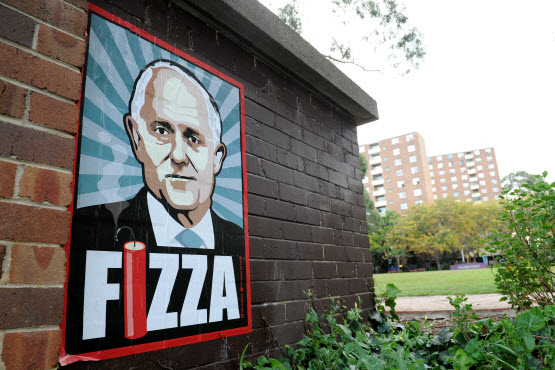While this election has included plenty of selfies, Snapchat and live blogging to the minute, there are still many ways in which we are campaigning like it’s 1999. So how and why are we stuck in a timewarp when it comes to our democracy?
Authorisations
Artist Michael Agzarian has been contacted by the Australian Electoral Commission and told to add an authorisation message to his Malcolm Turnbull “Fizza” posters or face fines under electoral laws.
Yet the Australian Manufacturing Workers Union is posting daily dank memes criticisng Malcolm Turnbull and the Liberals, and the union has faced no such warnings. Because the memes are not paid for, they aren’t considered to be advertising that should carry an authorisation, even though their purpose is to effect people’s voting intentions. In this case it’s a balancing act — if we required authorisations on every political photo or post uploaded on social media, our pollies wouldn’t have any characters left to use on Twitter.
Advertising
Political parties are prevented from advertising on television and radio broadcasts in the days leading up to the election, but not from advertising online or in print mediums:
“there is an election-advertising blackout on all TV and radio broadcasts from midnight on the Wednesday before polling day to the end of polling on the Saturday. This three-day blackout effectively provides a ‘cooling off’ period in the lead up to polling day, during which political parties, candidates and others are no longer able to purchase time on television and radio to broadcast political advertising.”
At the last election this “cooling-off period” didn’t provide much of a break, with advertisements continuing to appear online as banner ads and on YouTube. With more and more people receiving their news online, streaming content through YouTube and social media, does this policy actually create a “cooling-off period” at all?
Using footage of Parliament
Liberal Democratic Senator David Leyonhjelm has already been rapped over the knuckles by the Usher of the Black Rod for using footage from Parliament in an election advertisement but has refused to remove the ad from YouTube. Leyonhjelm, who takes a cavalier approach to rules he doesn’t agree with, used footage of Wayne Swan, Joe Hockey and Scott Morrison delivering their budget speeches, as well as his own speech in the Senate to accuse the parties of lying about the budget. As my colleague Myriam Robin has reported, Leyonhjelm and the Liberal Democrats were unlikely to face any concrete punishment, as the usual penalty for breaking standing orders is to be suspended from Parliament for a period of time. For any other sanction, a majority of senators would need to be convinced it was necessary.
“The idea that you can use that footage for everything except a political context seems to me to be an exercise in futility. At the end of the day, it is a political environment, a political debate, and to not be able to use the vision of what somebody said in a political context seems to me bizarre,” Leyonhjelm said.
If Leyonhjelm is not re-elected to the Senate, a punishment by suspension wouldn’t be very effective. If your average Joe used the footage there would be similar levels of effectiveness.
Donations declarations
Australian political parties are not required to declare their donations when they receive them, but instead the media and Australian public get annual dumps of information in February, for the previous financial year. In the case of elections held in the last six months of a calendar year — say the 2013 federal election, held in September, the donations are not declared publicly until at least February 2015. My colleague Bernard Keane has said it many times, and he says it best, that a lack of real-time declarations means that political parties escape proper scrutiny when we find out about donations sometimes over a year after they have been made:
“It’s rare that donors actually want to hide their donations — ‘I don’t need to hide my light under a bushel,’ said one big Liberal donor. There’s no reason why companies and parties couldn’t report donations instantly, or within a matter of days, rending moot the whole process of looking back 17 months and checking different financial years, thereby significantly improving real-time accountability.”
Voting
Although we will vote this year with reformed Senate voting laws, the act of numbering boxes with a pencil on a ballot paper has remained largely unchanged in Australia. While some jurisdictions have experimented with online or electronic voting, voters in 2016 will still take part in a largely analog process. There are many good reasons why we haven’t moved to e-voting, either online or through an offline computer systems, with risks that people’s votes might not be private and anonymous, or could be tampered with. But that particular remnant of the 19th century doesn’t bother me so much — putting pencil to ballot paper is half the fun.










Voters who are abroad can no longer attend the Oz embassy/high commission to vote as in days of yore – it must be done by teh Intertube.
My State member last year refused to send me a postal vote form though that could have been simple personal animosity as she knew full well my antipathy to her.